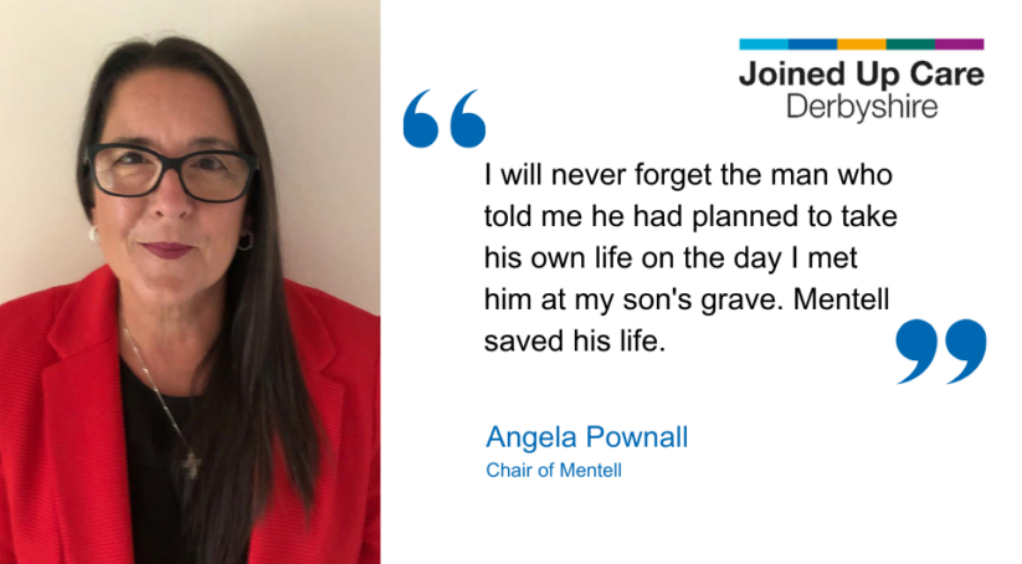How losing two family members to suicide inspired my mission to help prevent tragedy for other men
Angela Pownall is a registered social worker and a former registered nurse who currently helps to coordinate NHS services in the High Peak. Angela also chairs the trustee board for the UK charity Mentell.
Angela works with a group of dedicated staff, trustees, and volunteers to provide men with safe and confidential spaces to talk, free from advice and judgement.
By Angela Pownall Operations Manager, Team Up Derbyshire
To mark World Suicide Prevention Day (10th September), I wanted to share a story that is very personal to me about one of my family members, and one that I hope will contribute to changing the narrative around men’s mental health and suicide.
7 years ago, my son Adrian lost what he described as a ‘battle with his demons’. He struggled with his mental health for some time prior to his death.
My initial reaction to losing Adrian in this manner was devastation, dis-belief, and anger. Of course, these emotions can be associated with any form of grief, and I do not wish to diminish the fact that grief is horrendous in all circumstances. However, the intense emotional and physical pain of losing someone because of a self-inflected death coupled with the feeling of guilt, regrets, and the added stigma often found in society around death from suicide was, and continues to be, completely different to any other loss that I have experienced.
In the weeks and months that followed my son’s death I simply could not dismiss the fact that Adrian’s death was preventable, and, in my mind, something had to change, I felt that I had to use my professional knowledge and skills positively and help other people in my community. I believed that together, we could save lives.
I needed to do something to prevent this from happening to others. I lived in Glossop at the time and Adrian lived just up the road in Tameside. We struggled to gain access to support and services for Adrian, and I believe that had my son had something like Mentell, maybe things could have turned out differently and he may still be with us today.
Mentell began as a simple idea, eight years ago. A group of seven men met up in Stockport after one of them posted on social media that he was struggling and needed someone to talk to. The men didn’t have to speak if they didn’t want to, they could just sit and listen. That’s how it all started.
When I found out about this group, I dedicated myself to creating something meaningful in my own community, a space where men could come together, talk, and support each other.
A year later, Mentell became an official charity and expanded across the High Peak, and since then, nationally. It has grown so much over the years, but the heart of it remains the same, it is a space for men, facilitated by men.
To date, 5,208 men have signed up to become Mentell members across the country.
I will never forget the man who told me he had planned to take his own life on the day I met him at my son’s grave. He told me that following our conversation he joined the group and Mentell saved his life, and it is stories like this that remind me how important it is to talk about suicide and mental health.
Often, we talk about suicide statistics. Anyone can have thoughts of suicide or wanting to harm themselves. A recent NHS survey found that 1 in 15 people have attempted suicide, 1 in 12 people have self-harmed and 1 in 5 of us have had a thought of suicide. In the UK, suicide is the single biggest killer of men between the age of 30 and 34.
However, coronial inquests often attribute deaths to drug toxicity, alcohol, or misadventure, meaning true suicide figures could be higher. After my son’s inquest revealed significant gaps in support for families, I joined the charity Inquest.
Inquest provides expertise on state-related deaths and their investigation, focusing on cases involving police, prison custody, and mental health settings. Through my involvement, we’ve successfully driven changes in mental health assessments, A&E systems, risk management, and the legal process. We’ve also helped secure better funding for legal representation at inquests.
As individuals, as groups, and as communities, we can find the strength to make a change. We need to let people know that there is hope. You must find that hope and channel it into something positive.
Mentell has been a lifeline for so many men, and I’m proud to be a part of it with the thousands of supporters across the country. I want to encourage anyone who is struggling to reach out. You don’t have to go through things alone. There is a community waiting for you, a community that understands and supports you.
Suicide Prevention isn’t tied to a day, it is everyday life for many people, and we need to work together to change the narrative. Its not the statistics that make suicide real, it’s when someone you love is one of the numbers.
Men, is it time to talk? Visit Mentell https://www.mentell.org.uk/
Visit Inquest www.inquest.org.uk

